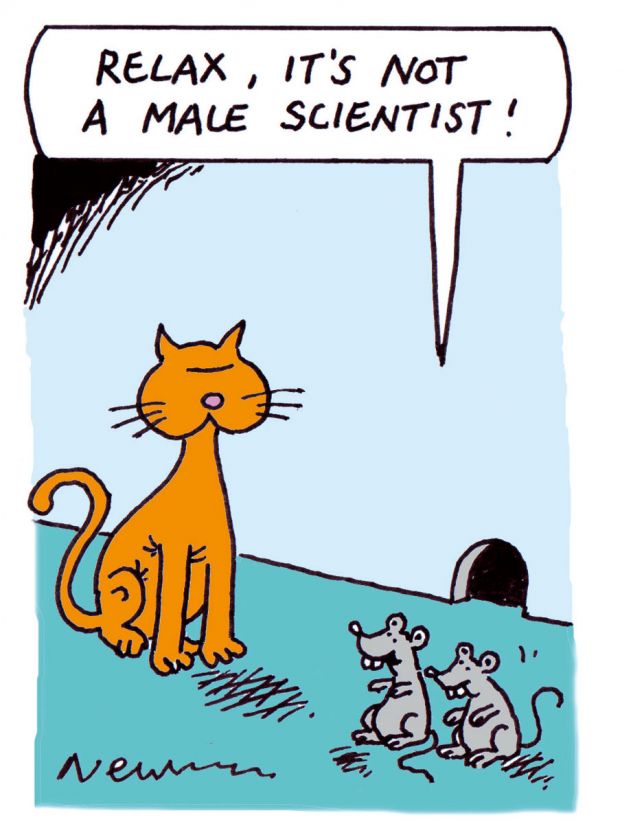
- More than 600 past and present students from the University of Derby have been put at risk of contracting HIV and hepatitis after a healthcare worker failed to change parts of a syringe during blood tests and vaccinations. According to the Daily Mail on 29 April, the students were given the warning after an investigation into a health worker who provided services for Derby’s Occupational Health Service. The worker failed to change the barrels of syringes used for treating patients between 2005 and 2013, and all have been advised to seek blood tests. Since the needles themselves were always changed, the risk of infection is thought to be low, but Derby has set up an advice line and its vice-chancellor John Coyne called the situation “deeply regrettable”.
- Decades of research with mice may have to be reinterpreted after it was revealed that the presence of male researchers is as stressful for the rodents as swimming in cold water for three minutes or being stuck in a plastic tube for 15 minutes. In a paper in Nature Methods, reported by The Times on 29 April, researchers from Canada’s McGill University report that even exposure to a T-shirt previously worn by a man triggers a stress response that blunts the rodents’ experience of pain – measured according to the “mouse grimace scale”. The researchers believe that pheromones shared by male mice and humans mean that the rodents regard men as a territorial threat.
- Canadian researchers have also discovered that snooty sales assistants only increase shoppers’ desire for their wares – provided they work in posh shops. According to the Daily Mail on 30 April, a team from the University of British Columbia asked volunteers to interact with an actor pretending to be a shop assistant at either a high-end boutique or a high street store. They found that those who felt rejected by the boutiques desired their brands even more, and were willing to shell out more for them, than the shoppers who were treated better. However, the same effect did not occur in the standard “clobber floggers”, so those universities thinking of trying the uppity approach during student open days had better be pretty sure of their place in the pecking order.
- One chap who is pretty sure of his place in the pecking order is Oxford Union president Benjamin Sullivan – as attested by his membership of what The Times referred to on 2 May as the “sexist and ‘elite’ drinking society called the Banter Squadron”. Mind you, it did take him a while to recall the fact. When online student paper The Tab Oxford first revealed his membership of the Christ Church society, he asked the Oxford Union for £1,000 – plus VAT – to help him sue the paper. But the union withdrew its offer after a revolt by members, and Mr Sullivan eventually apologised to the paper and admitted that the Banter Squadron was “an ironic term that has sometimes been used to refer to our group of friends”. The society was founded by “a group of libertines with exceptional chat”. But that is where its resemblance to the Russell Group ends.
- The arrest last week of Sinn Féin president Gerry Adams could prevent future historians from learning the truth about important events, critics have claimed. Mr Adams’ detention for alleged involvement in the 1972 murder of Jean McConville followed the release of taped interviews with former paramilitaries recorded by Boston College researchers. The interviewees were given a guarantee that the tapes would not be released until after their deaths but they were obtained by the Police Service of Northern Ireland after the US Supreme Court ruled that the US’ treaty obligations to aid UK law enforcement took precedence over academic freedom. Times columnist Ben Macintyre wrote on 2 May that the ruling had already dissuaded other potential interviewees from participating in the Belfast Project, and would undermine historians’ and journalists’ ability to guarantee their sources confidentiality. Meanwhile, Ed Moloney, an Irish journalist who was one of the researchers in the Boston project, told The Boston Globe that the “whole process of conducting academic research” in the US on “sensitive subjects with confidential sources” had been dealt “a death blow” by the decision to pursue the tapes.
Register to continue
Why register?
- Registration is free and only takes a moment
- Once registered, you can read 3 articles a month
- Sign up for our newsletter
Subscribe
Or subscribe for unlimited access to:
- Unlimited access to news, views, insights & reviews
- Digital editions
- Digital access to THE’s university and college rankings analysis
Already registered or a current subscriber? Login
